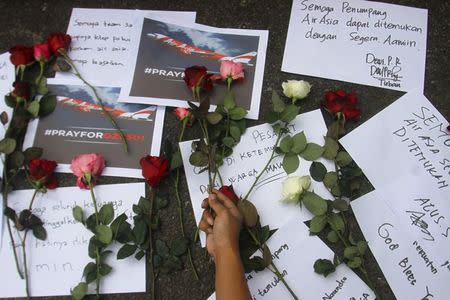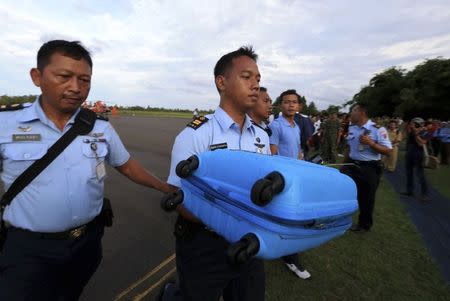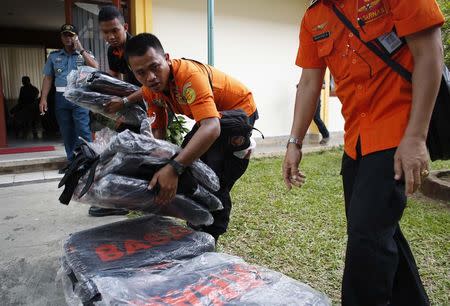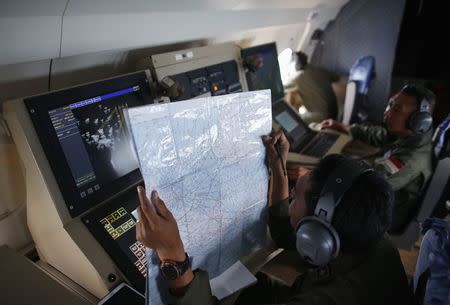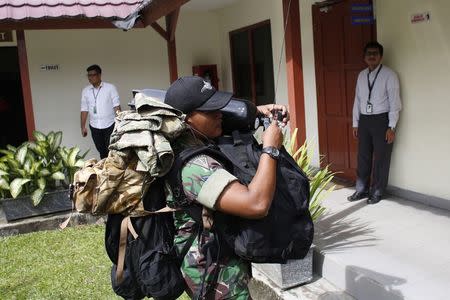Bodies, debris from missing AirAsia plane pulled from sea off Indonesia
By Gayatri Suroyo and Adriana Nina Kusuma SURABAYA, Indonesia/JAKARTA (Reuters) - Indonesian rescuers searching for an AirAsia plane carrying 162 people pulled bodies and wreckage from the sea off the coast of Borneo on Tuesday, prompting relatives of those on board watching TV footage to break down in tears. Indonesia AirAsia's Flight QZ8501, an Airbus A320-200, lost contact with air traffic control early on Sunday during bad weather on a flight from the Indonesian city of Surabaya to Singapore. The navy initially said 40 bodies had been recovered, although other media later quoted the head of the search and rescue agency, Fransiskus Bambang Soelistyo, as saying only three bodies had been retrieved. The plane has yet to be found. "My heart is filled with sadness for all the families involved in QZ8501," airline boss Tony Fernandes tweeted. "On behalf of AirAsia, my condolences to all. Words cannot express how sorry I am." The airline said in a statement that it was inviting family members to Surabaya, "where a dedicated team of care providers will be assigned to each family to ensure that all of their needs are met". Pictures of floating bodies were broadcast on television and relatives of the missing already gathered at a crisis center in Surabaya wept with heads in their hands. Several people collapsed in grief and were helped away. Yohannes and his wife were at the center awaiting news of her brother, Herumanto Tanus, and two of his children who were on board the doomed flight. The Tanus family had been on their way to visit Herumanto's son, who studies in Singapore and who traveled to Surabaya on Monday after the plane went missing. "He cries every time he watches the news," Yohannes said. The mayor of Surabaya, Tri Rismaharini, comforted relatives and urged them to be strong. "They are not ours, they belong to God," she said. SEARCHING THROUGH THE NIGHT A navy spokesman said a plane door, oxygen tanks and one body had been recovered and taken away by helicopter for tests. "The challenge is waves up to three metres high," Soelistyo told reporters, adding that the search operation would go on all night. He declined to answer questions on whether any survivors had been found. About 30 ships and 21 aircraft from Indonesia, Australia, Malaysia, Singapore, South Korea and the United States have been involved in the search. The plane, which did not issue a distress signal, disappeared after its pilot failed to get permission to fly higher to avoid bad weather because of heavy air traffic, officials said. It was traveling at 32,000 feet (9,753 metres) and had asked to fly at 38,000 feet, officials said earlier. Pilots and aviation experts said thunderstorms, and requests to gain altitude to avoid them, were not unusual in that area. The Indonesian pilot was experienced and the plane last underwent maintenance in mid-November, the airline said. Online discussion among pilots has centered on unconfirmed secondary radar data from Malaysia that suggested the aircraft was climbing at a speed of 353 knots, about 100 knots too slow, and that it might have stalled. Investigators are focusing initially on whether the crew took too long to request permission to climb, or could have ascended on their own initiative earlier, said a source close to the probe, adding that poor weather could have played a part as well. He cautioned that the investigation was at an early stage and the black box flight recorders had yet to be recovered. CLUES WHEN THINGS GO WRONG The plane, whose engines were made by CFM International, co-owned by General Electric and Safran of France, lacked real-time engine diagnostics or monitoring, a GE spokesman said. Such systems are mainly used on long-haul flights and can provide clues to airlines and investigators when things go wrong. Three airline disasters involving Malaysian-affiliated carriers in less than a year have dented confidence in the country's aviation industry and spooked travelers across the region. Malaysian Airlines Flight MH370 went missing on March 8 on a trip from Kuala Lumpur to Beijing with 239 passengers and crew on board and has not been found. On July 17, the same airline's Flight MH17 was shot down over Ukraine, killing all 298 people on board. Bizarrely, an AirAsia plane from Manila skidded off and overshot the runway on landing at Kalibo in the central Philippines on Tuesday. No one was hurt. On board Flight QZ8501 were 155 Indonesians, three South Koreans, and one person each from Singapore, Malaysia and Britain. The co-pilot was French. U.S. law enforcement and security officials said passenger and crew lists were being examined but nothing significant had turned up and the incident was regarded as an unexplained accident. Indonesia AirAsia is 49 percent owned by Malaysia-based budget carrier AirAsia. The AirAsia group, including affiliates in Thailand, the Philippines and India, had not suffered a crash since its Malaysian budget operations began in 2002. (Additional reporting by Fergus Jensen, Wilda Asmarini, Charlotte Greenfield, Fransiska Nangoy, Cindy Silviana, Kanupriya Kapoor, Michael Taylor, Nilufar Rizki and Siva Govindasamy in JAKARTA/SURABAYA, Al-Zaquan Amer Hamzah and Praveen Menon in KUALA LUMPUR, Saeed Azhar, Rujun Shen and Anshuman Daga in SINGAPORE, Jane Wardell in SYDNEY, Tim Hepher in PARIS and Mark Hosenball, David Brunnstrom and Lesley Wroughton in WASHINGTON; Writing by Dean Yates and Robert Birsel; Editing by Nick Macfie and Mike Collett-White)


